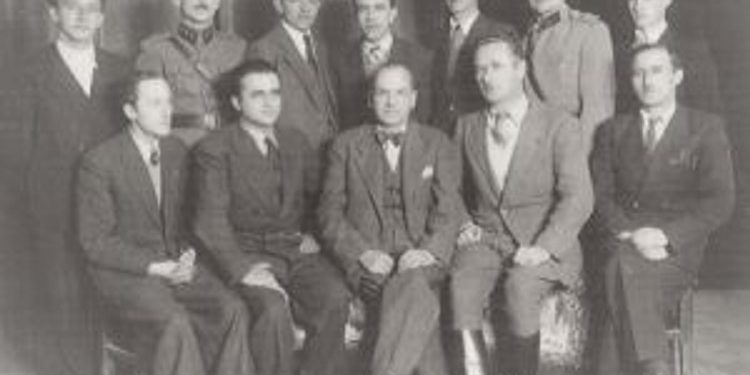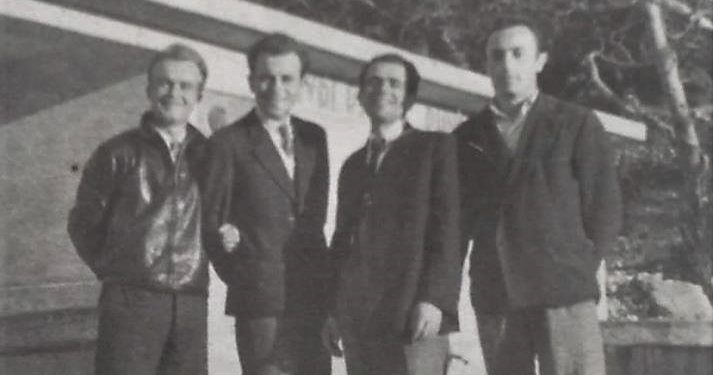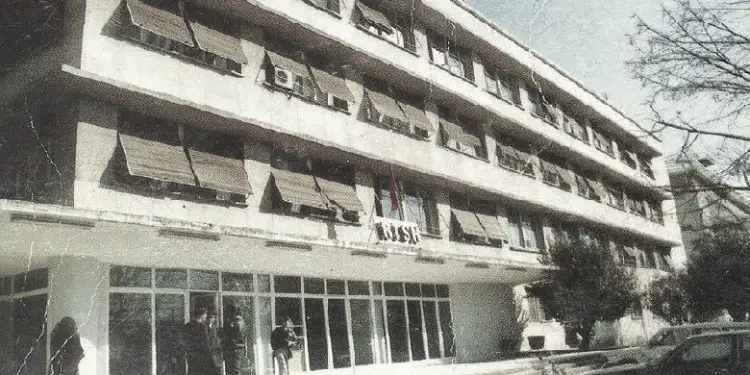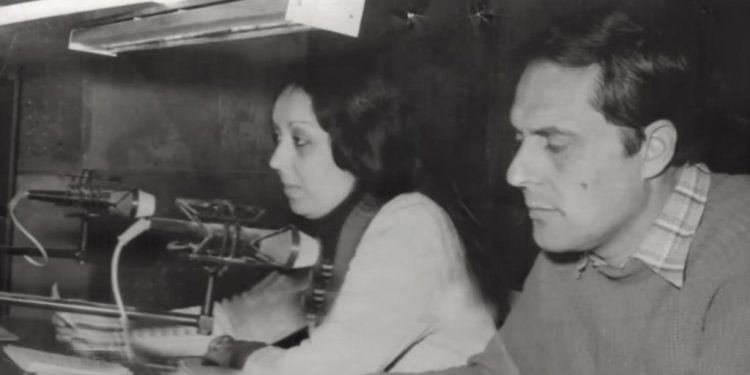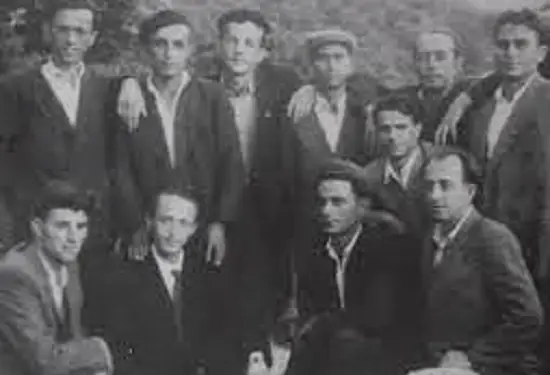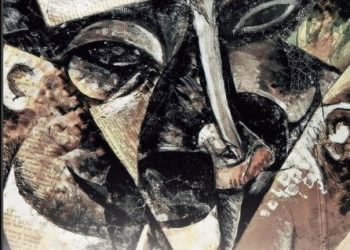By Bashkim Trenova
Part eleven
Memorie.al publishes the memoirs of the well-known journalist, publicist, translator, researcher, writer, playwright and diplomat, Bashkim Trenova, who after graduating from the Faculty of History and Philology of the State University of Tirana, in 1966 was appointed a journalist at Radio- Tirana in its Foreign Directorate, where he worked until 1975, when he was appointed as a journalist and head of the foreign editorial office of the newspaper ‘Zeri i Popullit’, a body of the Central Committee of the ALP. In the years 1984-1990, he served as chairman of the Publishing Branch in the General Directorate of State Archives and after the first free elections in Albania, in March 1991, he was appointed to the newspaper ‘Rilindja Demokratike’, initially as deputy / editor-in-chief and then its editor-in-chief, until 1994, when he was appointed to the Ministry of Foreign Affairs with the position of Press Director and spokesperson of that ministry. In 1997, Trenova was appointed Ambassador of Albania to the Kingdom of Belgium and to the Grand Duchy of Luxembourg. Unknown memories of Mr. Trenova, starting from the war period, his childhood, college years, professional career as a journalist and researcher at Radio Tirana, the newspaper ‘People’s Voice’ and the Central State Archive, where he served until the fall of the communist regime of Enver Hoxha, a period of time when he in different circumstances became acquainted with some of the ‘reactionary families’ and their sucklings, whom he described with a rare skill in a book of memoirs published in 2012, entitled’ Enemies of the people ‘and now brings them to the readers of Memorie.al
Continued from the previous issue
Enemies of the people
The colleague of the office, Arshini, with the ‘shadow’ of his uncle who had been mistakenly shot by the partisans!
Remembering “the past” reminds me of one night while I was still working at the Foreign Radio. The polite and timid Arshin asks me to accompany me on the way home. He told me he wanted to talk something, he had a scratch. Along the way he tells me that he loved a girl, a technician at the Albanian Radio-Television. She loved him too. Their relationship troubled the girl’s parents, who had good biographies. If I am not mistaken, her father was an officer. He had “discovered” that Arshini had an uncle shot by the partisans. Arshini, in fact, had an uncle who had been mistakenly shot by partisans. To cover up this tragic mistake, he was declared by them as a ballist, i.e. sympathizer or member of the nationalist organization that, in its segments, openly collaborated with the Nazi occupiers. He, in fact, had never been a ballist. Later, it seems to me that he was acquitted, but until he got here, Arshini lived with uncertainty about the present and the future, between sincere love and possible abandonment, normal and an unknown end.
With the beginning of the Democratic Movement, Arshini also joined the ranks of democratic forces. This was probably his “revenge,” even though he was neither angry nor vindictive. After the victory of democracy, he left together with his wife and daughter as refugees in Italy where he still lives today. No one expected him there, but he fled to leave behind the past, hoping to build a new life, just as some 1.5 million of his compatriots fled. I learned that in the beginning he did ordinary jobs, just like the vast majority of immigrants who are lucky enough to be engaged in a job. One day my niece’s husband, Venus, an Italian from Lugo, while I was working at the Foreign Ministry, comes and meets me and brings me a box of chocolates from Arshini. This is also my last “meeting” with him.
While I had not met Dervish Dumi for about 15 years and Arshin Ruçaj has not met him for over 17 years, with Albert Shala or, as his friends call him, Bert, the ties have never been severed. We met in Brussels where I have lived with my family for more than 15 years, we met in Amsterdam where his eldest daughter Albana lives with her two sons, in Antwerp as well as in Tirana where I return from time to time to meet my brother my Gencin as well as my friends who live there.
Another colleague, Albert Shala, was fired from Tirana for “biographical stains”
Berti came to Tirana from the northern city of Albania, Shkodra. This city is known for the inexhaustible humor of its inhabitants, for an ancient cultural tradition as well as for the persecution of the Catholic clergy during the communist era. Unlike Dervishi, full of temperament and, if hurt, even aggressive, Berti was a smiling, calm man, avoiding conflict. He liked to throw on a piece of paper our caricatured portraits. He would later discover his talent as a painter, especially in the field of landscape. Like all of us, who graduated and got a job at Radio Tirana, Berti was without a “stain” in his biography. His family was associated with the anti-fascist resistance and, consequently, with communism after World War II.
Berti would not be long without a “stain” in his biography. As our mutual friend, Agron Çobani, writes in his book “Tirana speaks to you”, “it would be the same fate for Berti as for many”. In 1974 he was criticized in the Party organization as a “liberal”. This quality was worn by those who were labeled as enemies of the Party and the people, those who sought to soften the class war and turn Albania into capitalism! The Party organization decided to remove him from Radio Tirana as well as from the city of Tirana. Berti moved to Kruja, a small mountain town north of the capital. In Kruja he would start working first as a journalist in the local newspaper “Kastrioti” and then as editor-in-chief of this newspaper. There he will stay for a period of 8 years together with his family, who were forced to leave Tirana. But, why did they unite Berti “with the many”?!
In June 1974, the IV Plenum of the Albanian Labor Party was held, a plenum that condemned “liberalism” as a weapon of bourgeois degeneration. This Plenum came after the XI Radio and Television Song Festival, which was declared a heretical festival. His songs would be banned from being broadcast by Radio Tirana and would be included in its black fund. Some singers, composers, organizers and directors of this Festival, would end up in prison; others would not be left unpunished. Nefo Myftiu, the wife of Manush Myftiu, a member of the Politburo of the Labor Party and the first Secretary of the Party Committee for the capital, did not escape either. Nefo was a rare woman, especially when judged by her political and social position, compared to others living in what was called the Bloc, i.e. in the hermetic neighborhood of the communist dome. Nefo had a big heart and had no sanctified quotes of Marx, Stalin or Enver in its place. She was the Director of Radio Tirana and under her supervision was the preparation of the XI Song Festival on Radio Television. The condemnation of the Festival was also the condemnation of Nephos. She was fired from Radio Tirana and sent to work as Deputy Director of the Migjeni Artistic Enterprise, an enterprise that produced artistic objects and clothing based on popular motives. Here, as far as I can remember, begins Bert’s liberal “sin”.
Colleague Shala suffered after proposing that the Director of Radio, not to leave Tirana, but to serve his sentence there!
Nefo Mufti supported the young, the talented. So was Bert. She often exchanged views with Bert, whom she appreciated for many reasons. We, the other young people, saw Bert as her trusted “consultant”. Mutual respect and generally correctness in their working relationships, we valued as a model. I myself had the bad luck to work with a director and then also with a chief of staff, who in relations with employees were quite the opposite of this model. Berti, it seems, when Nefo was convicted felt the same moral debt to her. To be at peace with his conscience he rose and took the floor at the meeting of the Party organization. He proposed that Nefo Myftiu not leave Radio Tirana, but to make up for the mistake where he had committed it, that is, on Radio. That was enough for him to “accompany” Nefon outside the doors of the Radio as a “liberal”, unworthy of this institution. To me, Berti showed character. For the Party people of character were targeted.
The IV Plenum warned of other “sacrifices” as, according to him, ideological and artistic degeneration preceded conspiracies and coups against the Party leadership. After him followed the story of the barbaric annihilation of the so-called hostile groups in the army, defense, economy, foreign trade, agriculture, but also in education, culture, transport, etc.
After the IV Plenum the dictatorship savagely attacked all art and culture. True art was denied. Foreign operas were banned, mass songs for the Party, for Enver, began to dominate. The irony was that while singing to the Party and two hundred “petritas”, i.e. of its two hundred founders, who “opened the red history”, of the two hundred, only Enver Hoxha remained glorious. A handful of them were killed during the war. Most declared them traitors and were either imprisoned, shot, or fled Albania. In this communist Taliban rage, the great Albanian writer, Ismail Kadare, several times nominated for the Nobel Prize in Literature, would publish in 1974, in the newspaper “Drita” an article on some issues of war and the defense of literature ours”. In this article he will express: of pacifist illusions, which are so zealously propagated today in the bourgeois-revisionist world. “He, in a way, becomes the speaker of this infamous Plenum! Was he forced? He himself said years later that he was not a hero and did not even want to be a hero. In fact, Kadare survived to be the hero of Albanian letters.
For Bert it must be said that in all this carnage, however, he escaped peace with so much. On October 23, 1981, he appeared in the newspaper “Zeri i Popullit” in the Information Sector. Bert was appointed head of this Sector. Remembering this day, he recently sent me a message where he wrote: “It was raining and I was wet, but I do not know why I was shaking – from the fact that I returned to Tirana again, because otherwise my bones would remain in Kruja, or that the cold had entered my marrow”.
The return of Bert Shala from Kruja to “Zeri i Popullit” and why could I not take him to ‘RD’?
Berti continued to work in “Zeri i Popullit” even after the establishment of democracy in Albania. He has made some cautious articles criticizing the mistakes of the new rulers, mainly from the ranks of the Democratic Party. I wanted Berti to work for the newspaper “Rilindja Demokratike”, which I was running at the time. I talked about this with Sali Berisha, the chairman of the Democratic Party, then president of the Republic. Saliu told me: “Berti is a good boy, but he is already positioned with his articles”. Saliu thus forgot what he himself had said that “in a democracy there is no delay”. Despite this fact, I think that Berti, although he stayed until the end in “Voice of the People”, even there with his critical writings has served democracy. After all, an uncritical democracy is no longer a democracy, but a democracy. Before retiring, Berti published a book dedicated to all the editors-in-chief of “People’s Voice”. In fact, this serious publication is, in a way, the very story of “Voice of the People”, even the only story of this newspaper, which for almost half a century was the main newspaper in Albania, the newspaper to give glory or bury one hundred I saw under the ground.
After a lot of hard work and responsibility for several decades, Berti also reached retirement age. He retired, but was not granted the right to remuneration like all retirees. The editor-in-chief of “Zeri të Popullit”, Erion Braçe, had not paid to the Social Security the obligations that belonged to the newspaper. It took some time for retired Bert to finally receive his pension payment. Trouble in youth, trouble even in old age!
Conflict with my editor-in-chief, Kiço Pandeli, on Radio Tirana
At the time of the XI Radio and Television Song Festival and the IV Plenum of the Central Committee of the Labor Party, I was not on the Radio. After six years working for Foreign Radio, I applied to join the Labor Party. The basic organization of the Party accepted my request, so it accepted me as a candidate to become a member of the Labor Party. According to her decision, I was working, at the time, as a worker in the Construction Vehicle Workshop. The Wave of the IV Plenum, however, did not leave me alone either.
Months and years before the XI Radio and Television Song Festival took place, as well as before the IV Plenum of the Party Central Committee convened, I had criticized the director of Foreign Radio, Kiço Pandeli, the party secretary, Dhori Ninin, as well as my direct boss, Hasan Pincin, as bureaucratized, incapable of responding to the propaganda demands of the time, as arrogant, arrogant and intriguing. Kiço had learned some formulas to silence the employees, such as: “the state is me”, “I make the law”, “and the editor-in-chief is a dictator”. I had criticized him in a lightning bolt, calling him a communist bureaucrat. At the top of the leaflet I had put the quote – “Communist bureaucrat is the most dangerous bureaucrat.” According to what I had written, the authorship of the quote belonged to Stalin. This is what Dervish Duni told me and I believed it without verifying it. In fact, years later I read that this opinion was expressed by Lenin and not Stalin. However, no one questioned it at the time. Stalin was the Jesus or Muhammad of Albanian communism until the last days of his life.
I had criticized Hasan Pinci “for police methods at work”, that he secretly recorded the words of subordinates and used them at a time, which he deemed favorable. I had criticized him for what I said, for his servility towards the general director of the Albanian Radio-Television, Thanas Nano, and for his incompetence at work. I had criticized him for having strained relations with editors and translators, who, as a result, had either asked to be fired, or had warned that they would get into scandals, that they would be shot in the head, that they had allergies to it, etc., etc. In one case, I do not remember why, I was absent a few days at work. When I returned, Hasan Pinci came to my desk and extended his hand of “friendship”. I let go of his hand and said, “I would be heartbroken if I gave you my hand.”
I had said about Dhori Nini that he “degenerated as a communist”, that he was afraid of the General Director, Thanas Nano, about whom he had said that if you criticize him, “he makes you miserable”. In fact, he was right about Thanas. Dhori knew how he had said to Hysen Pojani: “To throw you on the main road, and leave the children without bread”! Dhori also knew how he fired Hyseni, a former partisan, old communist and seasoned journalist, to work in a remote village in Tirana. Despite these truths, Dhori was the secretary of the Party and to me he should have been an example of communist courage, of honesty.
Our two bosses who ran the Party propaganda on Foreign Radio did not know any foreign languages!
Kiço did not know any foreign language, but he followed the broadcasting of Foreign Radio programs, ie broadcasts in foreign languages, in order not to allow any ideo-political mistake to pass! He had no higher education, he had not graduated from any faculty, but the Party had charged him with directing foreign propaganda and the journalists, who worked in this sector, all of them with completed university studies. He was so scared that he found them wrong and even corrected the dictator’s own speeches, when we used parts of them without quoting the author and the source. He was afraid like a compass at work, he was an incompetent leader. So was Hasan Pinci, the editor-in-chief who “led” the struggle against modern revisionism and Soviet social imperialism. Both had neither opened nor would ever open to read a foreign newspaper, even though they were directing propaganda abroad, even though they should, in principle, with their knowledge open the horizon to us editors. Hasan, like Kiço, did not know Albanian correctly and no other language. He came to the Editorial Office from the army, in military boots.
Dhori Nini was similar to Kiço and Hasan. During those years, some foreign Marxists-Leninists from different Western countries also worked for the Foreign Radio. Among them was a Swiss couple, Nils and Renée Anderson. One day Rennée Anderson asks me to serve as a translator in a conversation she wanted to have with Dhori Nin. She asked Dhori Nini not to broadcast a column written by him that advertised the high yield of milk production from cows in Albania. According to Renées, with such a yield advertised as the “great success” of our socialist village, in the West they would laugh, so the effect would be the opposite of what we sought to achieve, instead of propaganda we would make a counter propaganda, an own goal. As Renée Anderson tried to explain, in Switzerland, Denmark, Belgium, etc., countries in the West, milk production from a non-socialist cow was much higher than that of socialist Albania. Dhori did not accept her reasoning. “For us,” he said, “it is a success.” After a few months Renée Anderson went on holiday to Switzerland. From there he sent quite a few postcards with pictures of Switzerland to Foreign Radio staff. Dhori Nini sent a postcard where he posed a stately Swiss cow! Dhori, likewise, continued to prepare and broadcast his columns to foreign listeners, as if addressing the Albanian listener. I remember another case when a French Marxist-Leninist, Michel, was called, after reading a column in the French show about the “further revolutionization of domestic life” in Albania, had a telephone conversation with her mother, who lived in Paris. Paris did not understand anything, because Albanian was spoken with a French dictionary. However she had remained pleased because she heard her daughter’s voice. This was, after all, the only motive for listening to Radio Tirana. After leaving Albania, Michel sent me a letter on August 31, 1973, repeating the same thing. In her letter, among other things, she writes: “It is extremely difficult to listen to Radio Tirana here … Moreover, its programs are really very, very little suited to its listeners …! In fact, most people, after listening to Radio Tirana, have been discouraged two or three times, either because of the technical difficulties (bad hearing), or because of the content, which does not attract them “.
The Radio staff voted on my proposal, to remove the three incompetent bosses!
For these and other reasons I had proposed in a meeting of the collective that Kiço Pandeli, Hasan Pinci and Dhori Nini, circulate, i.e. to move on to other tasks. At this time, in 1972, the dictator had delivered a speech in front of the cadres of the district of Mat, in northern Albania. From Enver Hoxha’s speech in Mat, it seemed as if the regime was creating a different atmosphere, as if the “voice of the masses”, that is, ordinary working people, was being sought, as if bureaucracy was to be struck everywhere, at every level. In this climate, the whole collective voted for the circulation of Kiço, Dhori and Hasan. The Foreign Radio Party organization would also agree with the decisions of the collective. Kiço Pandeli himself, Dhori Nini and Hasan Pinci, would show solidarity with the team. It did not even occur to me at the time that the Party itself had elected and placed them in the respective posts not accidentally, but that this was how it needed them, incompetent, mediocre, without character. These were the unconditional loyalists of the Party, the ‘robot homo’s komunistus’. Time would prove this truth to me without much delay. It would be another speech of Enver Hoxha, the one held in the IV Plenum of the Central Committee of the Party against “liberalism”, which would turn the course of events 180 degrees.
In his speech at the IV Plenum, Enver Hoxha, very aggressively, called for crushing every “modernist” and “liberal” show, as he described the even minimal efforts to give something new, outside the clichés, as in the field of art and culture, in the life of the Party, in the field of thought, in fashion, etc. In this case, his base of attack would be all the old conservative forces of society, which would line up under the banner of rescuing the Party from enemies. Memorie.al
The next issue follows




